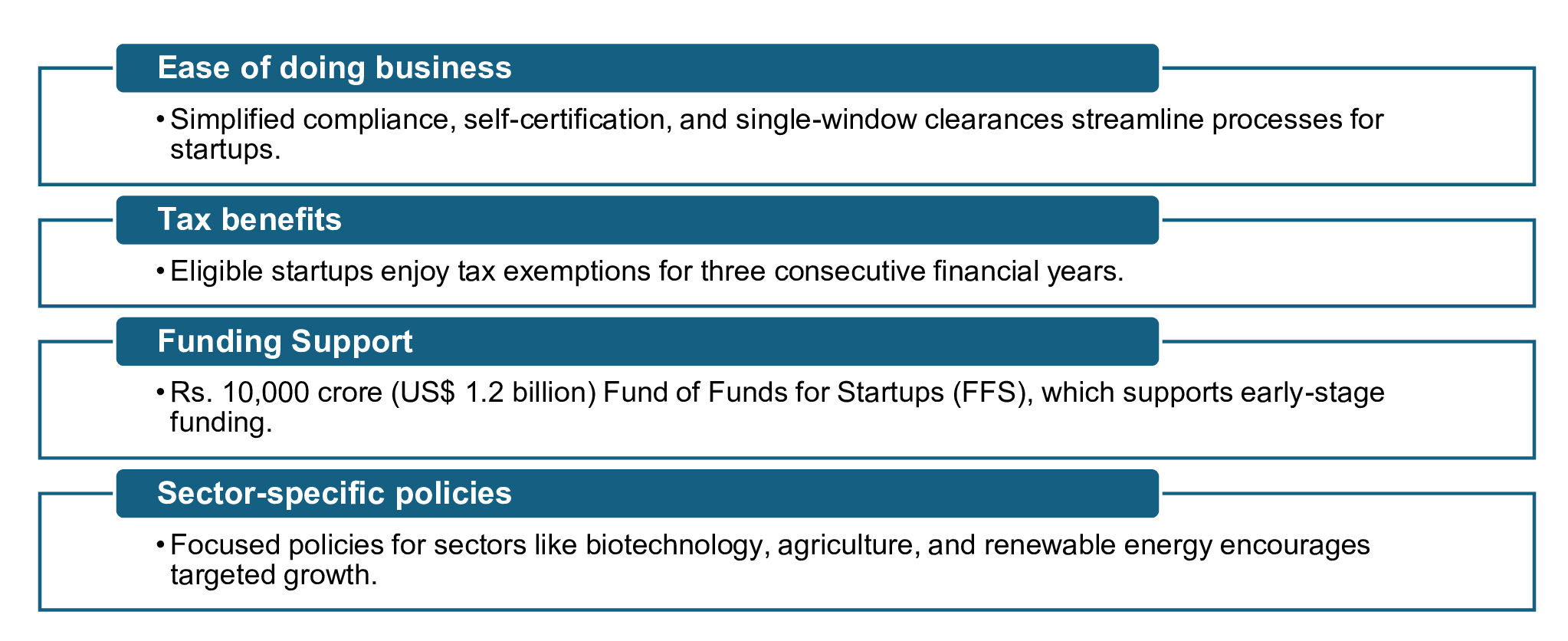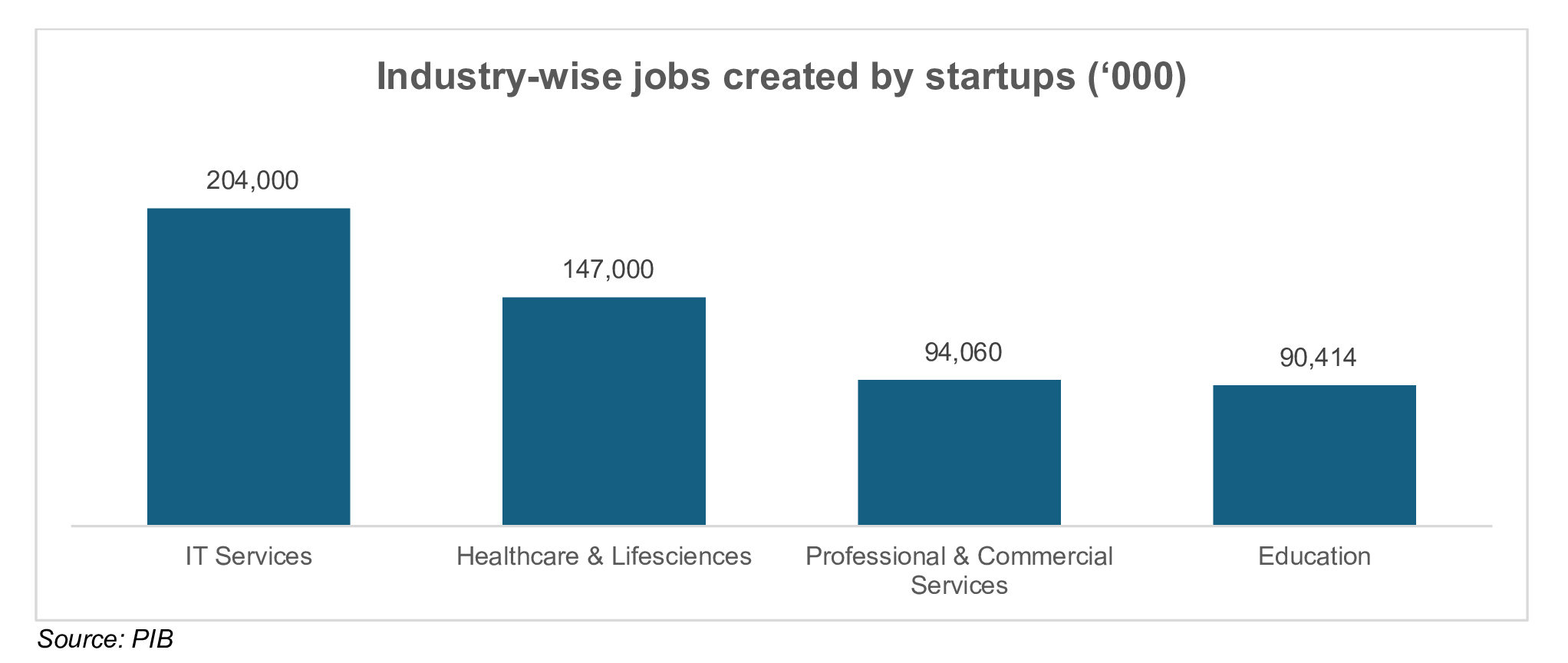SEARCH
RECENT POSTS
Categories
- Agriculture (32)
- Automobiles (19)
- Banking and Financial services (34)
- Consumer Markets (51)
- Defence (6)
- Ecommerce (21)
- Economy (68)
- Education (13)
- Engineering (6)
- Exports (21)
- Healthcare (25)
- India Inc. (8)
- Infrastructure (29)
- Manufacturing (28)
- Media and Entertainment (15)
- Micro, Small & Medium Enterprises (MSMEs) (15)
- Miscellaneous (30)
- Perspectives from India (34)
- Pharmaceuticals (4)
- Railways (4)
- Real Estate (17)
- Renewable Energy (17)
- Research and Development (9)
- Retail (1)
- Services (6)
- Startups (15)
- Technology (56)
- Textiles (7)
- Tourism (14)
- Trade (5)
The Role of Startups in India’s Economic Growth

India has emerged as one of the most vibrant global startup ecosystems, earning its place as the third largest startup hub. With over 100+ unicorns, the Indian startup landscape is shaping the future of entrepreneurship. As of December 2024, India has more than 73,000 startups with at least one-woman director that have been recognised under the Startup India Initiative. This represents half of the 1,57,066 startups supported by the government, showcasing the crucial role women play in driving economic growth.
The Indian enterprising spirit has undergone a paradigm shift in the last decade. Bengaluru, Hyderabad, Mumbai, and Delhi-NCR have emerged as hubs of innovation. The extensive access to affordable internet, along with a vibrant workforce, has driven the expansion of startups across various sectors, such as fintech, edtech, health-tech, and e-commerce. As stated in the "Indian Startup Ecosystem Report" of Startup India, India has used AI, blockchain technology, and the Internet of Things (IoT) to address international issues. This culture of innovation is supported by accelerators and organisations, along with strong mentorship. Together, they create an environment that focuses on solving local problems using advanced technology. Additionally, the significant rise in the number of startups have been fuelled by strong government support in the form of Startup India initiative.
Features of the Startup India initiative

Key milestones in India’s startup journey
Over the past nine years, the Startup India initiative has been pivotal in shaping a vibrant entrepreneurial ecosystem.


As of October 31, 2024, DPIIT-recognized startups have generated more than 1.66 million direct jobs across various sectors, making a substantial impact on employment creation.
Economic contributions of startups
Job creation
India boasts 112 million working-age individuals aged 20 to 24, surpassing China's 94 million. In the absence of government employment opportunities, this demographic advantage is propelling the growth of the country's startup ecosystem. As of June, 2024, India emerged as the world’s third-largest startup ecosystem, with over 1,40,803 DPIIT-recognised startups spread throughout 656 districts. These startups are enabling the creation more jobs compared to large enterprises in the same industry.
New investments
Many multinational corporations are now outsourcing their tasks to small businesses to focus on their core competencies. As a result, not only Indian venture capitalists but also many multinational corporations are closely monitoring the progress of Indian start-ups to invest their money. For example, Accenture provided Rs. 12 crore (US$ 1.35 million) worth of business to startups within FY24, allowing them an opportunity to impact both Indian and global markets.
GDP growth
Despite elevated inflation pressures owing to rising global food and fuel prices, India maintained its GDP growth rate at 8.2% in FY24, higher than other emerging economies. This sustenance of GDP has been partially due to rising startups and the economic benefits they offer to the nation.
Innovation and technological advancement
Numerous startups foster innovation and showcase how their advantages extend to even the most isolated customers. Fintech startups are now reaching out to remote areas and making financial solutions easily accessible in tier 2 and 3 cities. Hesa, a fintech and agri-tech startup can be a solution for rural problems by bridging the rural-urban divide with its technology. It effectively supports banking transactions, streamlines supply chains, and enhances the visibility of farmers' products in rural areas. While companies such as Zypp embrace eco-friendly electric vehicles to facilitate emissions-free last-mile shipping, rural prospects have simultaneously expanded. Entrepreneurial Indians inhabit regions far-removed from urban populations yet face fewer barriers marketing items abroad through digitization.
Government initiatives and support
Startup India Seed Fund Scheme (SISFS): Launched in 2021 with a corpus of Rs. 945 crore (US$ 109.2 million), this ambitious scheme aims to fuel India's innovative startup ecosystem by supporting ventures across developmental phases. The funding supports everything from validating initial concepts and building initial prototypes to conducting product trials, facilitating market entry, and scaling commercial operations. By late 2024, more than 2,622 emerging startups have benefited from the Rs. 467 crore (US$ 54.0 million) disbursed under this transformative initiative, turning their innovative ideas into tangible realities.
Credit Guarantee Scheme for Startups (CGSS): The Government of India launched the Credit Guarantee Scheme to create a standalone corpus for extending credit guarantees to recognized startups by the DPIIT. It permitted Scheduled Commercial Banks, Non-Banking Financial Companies and Venture Debt Funds under SEBI registered Alternate Investment Funds to give credit to start-ups. As of January 2025, the Startup India Seed Fund Scheme has provided 209 startups with loans amounting to Rs. 604 crores (US$ 69.8 million) while extending credit guarantees. This also included Rs. 27 crores (US$ 3.1 million) put aside for 17 women entrepreneurs, thus, supporting women leadership. These guarantees helped young firms to get the funding support from financial institutions and turned many innovative ideas into businesses.
Fund of Funds for Startups (FFS) Scheme: Established in 2016 with a corpus of Rs. 10,000 crores (US$ 1.2 billion), the Fund of Funds for Startups (FFS) enhances the availability of domestic capital for startups. Managed by SIDBI, it provides capital to SEBI-registered AIFs that provide funding to startups via direct equity and equity linked instruments. By December 2024, Rs. 6,886 crore (US$ 796 million) had been committed by the Department for Promotion of Industry and Internal Trade (DPIIT) to SIDBI, and Rs. 11,687 crore (US$ 1.35 billion) was committed by SIDBI to Alternative Investment Funds (AIFs) the scheme. This commitment catalysed investments of Rs. 21,276 crore (US$ 2.46 billion) in 1,173 startups.
To sum up, while celebrating nine years of the Startup India initiative, the country has seen a paradigm shift in the way the Indian population approaches entrepreneurship. India has confirmed its status as a global entrepreneurship hotspot by having more than 1.59 lakh DPIIT recognized startups and an increasing headcount. Startups in and out of non-metro cities have been empowered by the initiative’s support through flagship schemes, capacity-building platforms like BHASKAR and events like the Startup Maha Kumbh. The Startup India program continues to be the backbone of economy incrementation due to new job opportunities being provided, stimulating an inclusive entrepreneurial civilisation.
















